Analytics, Baltic States – CIS, Energy, EU – Baltic States, Forum, Latvia, Round Table, Transport
International Internet Magazine. Baltic States news & analytics
Friday, 09.01.2026, 05:20
Prospects for co-operation within the Nordic Baltic 8 Dimension Project
 Print version
Print version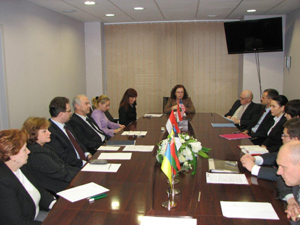 |
|---|
| International experts at the Round Table in BIA discuss the issues of “Nordic Baltic 8” co-operation. Riga, 24.11.2010. |
Professor Inna Stetsenko, Head of Doctoral Programmes, greeted the participants of the international seminar on behalf of the leaders of the Baltic International Academy.
By tradition, Dr. Olga Pavuk, BIA Associated Professor, assumed the role of discussion moderator. She reminded that issues of co-operation in the Baltic Sea region not once have been put for discussion at the Round Table during the last six years. Thus, a year ago, in October 2009, experts from various countries were discussing the topic “Transformation of Regional Economies of the Baltic Region Countries”.
For the period of 20 years close co-operation in the area of attracting investments has existed exactly among the Nordic and Baltic countries. If we consider Latvia, the list of top 10 foreign investors there includes Estonia (thanks to Swedbank), Sweden, Norway, Denmark, and Lithuania. Finland occupies the 12th place, and Iceland – the 17th. Together with Latvia these countries are members of the “Nordic Baltic 8”. Major spheres for attracting investments are: banking and communication sectors. Most harsh competition is registered in logistics and transport industry sectors.
Politics plus Economics
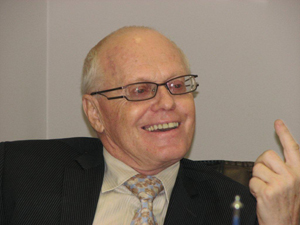 |
|---|
| Valdis Birkavs at the Round Table at the BIA. Riga, 24.11.2010. |
The tone for discussion was set by ex-Prime Minister Valdis Birkavs, one of the initiators of this project on the part of Latvia. According to him, the foundations for the “Nordic Baltic 8” (NB 8) were laid by the Ministry of Foreign Affairs of Latvia at the time when Māris Riekstiņš held the post of the Minister. “Together with the Minister for Foreign Affairs of Sweden we focused on the two directions: security and military co-operation. The project had two drawbacks. First, we did not discuss the issues of economic co-operation. Second, we did not talk about Russia and the USA,” tells V. Birkavs. In his view, The Baltic Course initiative to invite experts representing various economy sectors to discussion of the issues may be regarded as a new and very well-timed step in furthering the project.
V. Birkavs gave an outline of the positions of the “Nordic Baltic 8” member states:
“Finland says, ‘We plus Baltic and Nordic countries.’ At the same time, Scandinavian countries refuse to talk about the integration further than the existing one.”
Estonia: we plus Nordic and Baltic countries. Being at the right flank, Lutheran Estonia clearly co-operates with Finland.
Lithuania, which may be regarded as belonging to the left flank, has deep roots interlacing it with the Catholic Central Europe. At the same time everyone in Lithuania – beginning with the President and ending with scientists – are most zealous advocates of co-operation within the framework of “Nordic Baltic 8”.
Latvia has every prospect in front of NATO and EU to become the region most closely connected with Russia. All the eight taken together represent the ninth biggest world economy. Through co-operation with Russia it is ensured a prosperous future.”
Mr. Birkavs outlined the three periods passed by the Baltic countries in the course of evolution of relationships with the Nordic countries:
“The first one – from 1988 to 1991 – was the period of political romanticism when we had an absolutely clear notion about the things we needed for co-operation. We were absolutely clear about the goal as well – restoration of independence and consolidation on that basis.
The second period – from 1994 to 2004 – was the time when the Baltic countries knew what they wanted and the Nordic countries – what we needed. Co-operation and positive practical experience in moving towards EU and NATO rested on that foundation.
By 2004 we achieved the set goals. During the next six “bare” years the Nordic-Baltic co-operation lost its focus. This is the period of free conquest of the Baltic economic space without the right to send signals.”
V. Birkavs provided interesting facts as an example of different attitude of the NB 8 countries to each other. Three fourths of population of the Baltics feel positive about their Northern neighbours. At the same time, only 42% of the population of the northerners support the union of the Nordic and Baltic countries. Until recent time one of the impediments that prevented co-ordination was the national Baltic languages, which the Scandinavians allegedly did not need. However, today the young generation both there and here speaks English, and the problem has been resolved.
In the opinion of the Latvian ex-Prime Minister, our ambitious goal is to look forward, that is, to strive for closer relationship. The ministers however have stopped at a “softer” scenario – making co-operation more active. Nevertheless, out of the 38 suggested Strategy planks 16 were adopted at the Council of Ministers of the Nordic and Baltic States. The year 2011 was announced as the year of “Nordic Baltic 8” co-operation.
From competition to co-operation
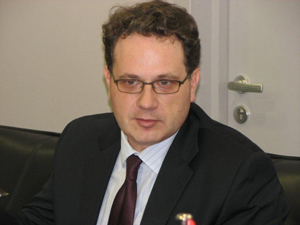 |
|---|
| Dainius Šriubša. BIA. Riga, 24.11.2010. |
Dainius Šriubša, the First Secretary of the Embassy of Lithuania in Latvia proceeded with the theme of co-operation on the basis of solution to political issues. He stressed that co-operation among the countries of the group of eight is regarded as a priority by Lithuania. The diplomat confirmed that after joining the EU and NATO the Baltic countries experienced certain vacuum, “We realised that we must regularly prove our independence in many aspects in front of Brussels, including in the sphere of power industry.” D. Šriubša noted that alliance with the Nordic countries might reduce nervousness in relations with Russia.
“First of all, I see particular advantage in the opportunity to assess possibilities of interaction in the struggle against various threats, co-operation in the sphere of energy security, prevention of cyber attacks, etc.,” considers the Lithuanian diplomat, “However, this approach has not yet won any particular support. We need to become the engine that would bring co-operation into motion.”
Mr. Šriubša also suggested coming up with the initiative to create the “Nordic Baltic 8” brand, which is well understood by big companies. “We wish that competition among the Baltic countries is transformed into co-operation. Environment for doing business on the territory populated by 7 million people proves more attractive for investors,” he stressed.
The audience present at the event was certainly interested to know about the progress of the new nuclear power plant in Lithuania. The latest news on this subject, according to the diplomat, is going to appear on 26th November, after the meeting of Latvian, Lithuanian and Estonian Prime Ministers. He also remarked that certain progress was registered in the gas sector in the field of creation of secondary gas market and resale to other consumers.
Being asked about construction of the nuclear power plant in Kaliningrad region the Lithuanian diplomat remarked sceptically that it was not important who is going to be the first to build a nuclear plant. The point is, to whom Kaliningrad is going to sell the energy.
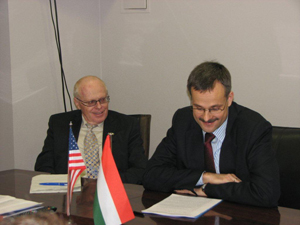 |
|---|
| V.Birkavs and I.Ābelis. BIA. Riga, 24.11.2010. |
After the Lithuanian diplomat the floor was taken by Indulis Ābelis, Head of European Department of the Ministry of Foreign Affairs of Latvia. He stressed that co-operation among the Baltic and Nordic countries is one of Latvia’s key foreign policy priorities since regaining of our independence.
There are a number of co-operation formats within the Baltic Region as apart from NB8 there exists NB6, and it is important to know and understand this in order to use this knowledge for any particular need. The NB8 co-operation report has triggered the discussion on the Nordic-Baltic relations; it has also created wider interest about the topic, says the official of the foreign-policy government department.
Mr. Ābelis also noted that increased integration of the energy market in the Baltic Sea Region will contribute to the stability and economic growth and improve the security of energy supply. Latvia together with Denmark is going to assume a coordinating role on energy co-operation in the Region. The Baltic Energy Market Interconnection Plan (BEMIP) serves as a backbone for co-operation in the area.
Baltic countries need common LNG terminal
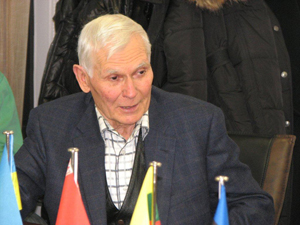 |
|---|
| Dr. Namējs Zeltiņš. BIA. Riga, 24.11.2010. |
President of Latvian National Committee of the World Energy Council, Professor, Dr. habil., sc.ing. Namējs Zeltiņš set discussion on a more practical platform. Talking about the projects of the new nuclear power plants he stressed that any investor would like to look at the business plan in the first place. For example, 60 companies in Finland, including Nokia, guarantee construction of nuclear power plants, that is, those who are going to buy the energy.
As concerns co-operation with Belarus in the sphere of energy saving, Mr. Zeltiņš told, it proves much easier there to solve all matters related to nuclear power plants, due to the country’s planned economy. Belarusians presented their requirements in respect of the nuclear power plant project and addressed them to Russia, France and South Korea. Only Russia was able to comply with the requirement to build the atomic plant within 6 years. “I think they are going to make it,” suggested Professor.
Speaking about gas supply in the Baltic Sea Region he noted that energy production objects are sheer paradise for terrorists, and everyone understands that just one energy source is not sufficient. The scientist proposes to create a group of energy experts that will help to solve a lot of issues including proprietorship and use of energy objects.
The Latvian scientist supports creation of the common terminal for liquefied natural gas (LNG) in the Baltic countries; until now we did not have an object of such type. Russia was intending to build LNG terminal near Saint Petersburg, however, this project has now been moved to Murmansk.
Not a single tanker carrying LNG has entered the Baltic Sea as yet. The European Union decided to allocate funds for the construction of LNG terminal in one of the ports in the Baltics or in Finland. “We need to prove the necessity of building such terminal in the port of Riga,” insists Mr. Zeltiņš. He also added that the project has found support of the Latvian Ministry of Economy. From the point of view of geographical location, Riga port becomes an ideal choice; the place in the Daugava estuary has been already selected and the land plot for terminal construction has been purchased.
The international energy expert considers that all the four states together should address the EU with the proposal to build the LNG terminal. The project of such scope implies involvement of the new technologies, new philosophy, presence of big money; its implementation will require the common effort of all the participants.
How to protect Baltic transit business
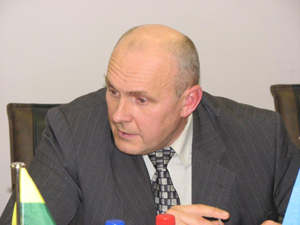 |
|---|
| Vice President of the Latvian Railway Ēriks Šmuksts. BIA, Riga, 24.11.2010. |
A recognized expert Ēriks Šmuksts, Vice President of Latvijas Dzelsceļš (Latvian Railway), in his usual emotional manner spoke of the role of transport industry within the framework of co-operation under the “Nordic Baltic 8” project. He was quite tough in describing the current situation in the Baltic States.
“After joining the EU and other organisations certain vacuum appeared in the Baltic countries. The Swedes took our banks, Denmark – our sugar. The railways were buried under the piles of numerous European directives and made bound to fulfil them, whereas these are not being fulfilled by other EU member states.
The problem lies in the uncertainty of the future of the whole transport industry. We are competing with Finland, and do not miss the opportunity to trip them up – and this is despite the fact that we all are inside the EU,” says Ē.Šmuksts, “95% of the total traffic volume via Baltic and Finnish ports is formed by transit and export. The potential of transport industry is at least 30%. Russia and other CIS countries know about our dissociation in the port business after privatisation; therefore, an “Estonian soldier” is not to blame, there is no use to find other reasons and lay the blame upon somebody else.
It would be good to feel that we are not merely small countries inside the EU; that we have someone there to intercede for us. Alas, the current situation goes like this: the one who first bends in front of Russia gets the cargo. We need to think on a government level, on the level of ministries of foreign affairs as well, how to protect transport industry in our countries.”
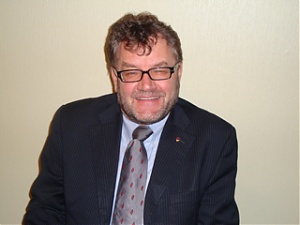 |
|---|
| Valdis Trēziņš. BIA, Riga, 24.11.2010. |
Valdis Trēziņš, President of the Association of Cargo Carriers Latvijas Auto, in absentio participant of the Round Table pays attention to the fact that after distribution of goods traffic flows within the EU the lion’s share of the car-borne traffic goes through the Nordic Baltic 8 region.
“Latvian carriers are interested to co-operate with the Nordic countries and the neighbouring Baltic States, although they are our competitors,” says he, “Nevertheless, the competitors have several areas in common where co-operation should be developed. First and foremost, it is development of multi-modal cargo transportation, and ferry service in the first place. As was demonstrated by the experience of Finland and Sweden, all Russia-related cargo transportation there is carried out by ferries.”
On disagreement among the Government, the Bank of Latvia and the Financial and Capital Market Commission
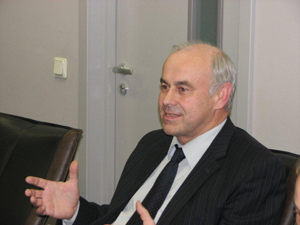 |
|---|
| Professor Valery Roldugin. BIA, Riga. 24.11.2010. |
In the opinion of Professor Valery Roldugin, Chairman of BIA Professors Council, Western Europe viewed post-Soviet economic systems as the new markets for increased volumes of own export (especially those subsided by the agricultural policy of the Common Market) and expansion of bank lending. Such policy, according to him, has lead to economic vassalage of the Baltic States and other post-Soviet countries, leaving their capacities beyond the solvency boundaries. The tax burden from business and real estate has been shifted upon labour force.
In many aspects this happened due to the policy pursued by IMF and EU institutions. They demand Latvia to develop tough plans, call for severe cost-cutting measures in public sector, in such areas of primary importance as schools and hospitals. Politicians and the Government made themselves liable to revise tax legislation. In reality, according to the banking expert, the main goal of such concentration of financial resources is to satisfy the interests of the banking sector.
“At the same time, methods of the monetary policy and control of credit transactions are far from perfection,” says V. Roldugin. “The Bank of Latvia cannot cope with price growth, whereas the Financial and Capital Market Commission appears not to be in full control of the credit transactions since a certain part of credit institutions is subject to formal control by the State Control authorities. Moreover, both these organisations are dissociated from governmental structures. One example that illustrates the case: the argument on the necessity of introduction of the unified labour payment system is still going on.”
Nordic Countries – reserve exit for the Baltics
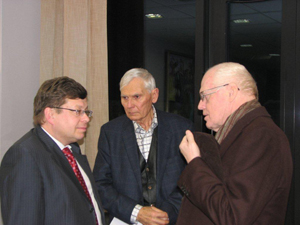 |
|---|
| Igor Zlotnikov. BIA. Riga, 24.11.2010. |
Vice President of Latvijas Krajbanka, student of BIA Doctoral Programme, Igor Zlotnikov spoke about the global crisis that long ago stopped being merely financial and economic but turned into the crisis of the system as such. From this perspective the “Nordic Baltic 8” project can be viewed in a completely different way.
“It seems to me that the project idea may become a strategic one if something is going to happen within the EU. Latvia is too small; in any case, it should join some alliance. It would be good to join the first-class company even if it were supposed to play a supporting role. The NB 8 project may become for the Baltic States a good exit from a difficult situation. The B3 union is impossible, whereas the NB 8 looks viable.”
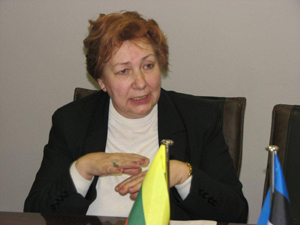 |
|---|
| Political scientist Ilze Ostrovska. BIA. Riga, 24.11.2010. |
In reply to the question whether the Nordic countries need us asked by Ilze Ostrovska, BIA Director of the Programme “European Studies”, Mr. Zlotnikov said, “Yes, they do. Banks of the Nordic countries, according to my estimations, hold from 3 to 4 milliard Euros in the Baltics. And this is beside the debt on a state level.”
Another question put by I.Ostrovska sounded as follows: what the regional project of the Baltic Sea countries has in common with NB 8 given the fact that Estonia prefers to be grouped with the Nordic countries, Lithuania tends to be looked at as a Central European state whereas Latvia positions itself as a Eurasian outpost in Europe.
V. Birkavs replied that the progress in the area of co-operation via the secretariat within the framework of 11 states has been very slow. Germany remains a permanent question, and some consider that it would have been better to stake on Germany. Until now there has been more competition than anything else in the co-operation development strategy of the Baltic Sea countries, only external circumstances and purposeful work make the countries co-operate. Answering the question “8 or 11” Birkavs replied without hesitation, “There will be no 11.”
V. Birkavs also explained why the Nordic countries look at NB 8 without much enthusiasm. “They have not understood yet with whom Germany is going to stay. There are certain forecasts that Latvia together with the other Baltic countries will leave the EU in 2014.” In the opinion of Mr. Ābelis relations between Latvia and Germany are developing, which has been proved by the recent visit of Angela Merkel to Riga. As regards co-operation with the Nordic countries, quite impressive investments are required here, according to Ābelis. Mrs. Ostrovska parried the state official with the remark that Latvia has already made its investment with labour resources that moved to the Nordic countries.
About the common policy in the higher education sphere
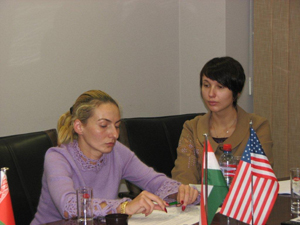 |
|---|
| Inta Buka (BIA) and Svetlana Auziņa (University of Tampere). Riga, 24.11.2010. |
Svetlana Auziņa, Doctoral Programme student at the University of Tampere (Finland), paid attention of the audience to co-operation between higher educational establishments of Finland and Latvia. “Higher Education Group (HEG) from Tampere University (Finland) has initiated academic partnership within the framework of joint professional skills improvement programmes in Latvia and stays open for co-operation with the partners in the Baltic countries,” says the representative of the Finnish university. “Universities should learn to diversify their funding base and grow entrepreneurial skills in order to react to the problems related to cuts in state financing and the pressure put by competitors’ requirements. HEG activities in the sphere of higher education and business administration are regarded as very successful in Finland. In connection with this we suggest that experience should be shared by the international partners within the Life Long Learning Programme addressed primarily to administration of universities and students, as well as ensuring development of entrepreneurial thinking among tutors and students.”
At the conclusion of the seminar Inta Buka, Head of the BIA Centre of International Study Programmes came forth with several proposals concerning development of the common policy in educational sphere within the framework of the “Nordic Baltic 8” project.
Today on the territory of the European Union and accordingly in the Nordic countries there exist lots of various international programmes in higher education sphere, including the programme ERASMUS as well as the programmes of the Nordic Countries Foundation that has a representative office in Latvia, and Norwegian programmes, etc. This leads to significant dispersion of the funds allocated for implementation of joint education programmes among different international programmes and foundations.
Thus, relations among educational establishments of the Nordic countries are built chaotically and depend primarily on the already available partners and concluded cross-university co-operation agreements, on the level of interest in participation and availability of information on implementation of some particular programme or grant.
I. Buka considers that in case of joint participation of universities of the Nordic countries in international education programmes and grants, double and triple diploma programmes, in creation of the new education programmes on the basis of universities of the Nordic countries, all the Baltic countries would be able to increase attractiveness and raise popularity of local universities as well as more effectively participate in acquisition of the programmes of European funds that allocate funds for development of higher education in the European Union.
“It would be good to formalise these issues in the developed government programme for accumulation of the mentioned financial resources. We propose to create work groups, which would include representatives from universities of the Nordic and Baltic countries for setting further directions and creation of development programmes in the higher education sphere,” says I.Buka. “It would be good if resolutions on higher education included matters concerning movement and adaptation of the students who study in the Nordic countries, exchange of professors and implementation of joint programmes. If work groups on higher education matters are created, we would like that a number of BIA representatives join these groups as well.”
I. Buka also informed the participants of the Round Table that in June 2011 the Baltic International Academy together with Polish universities is planning to organise the conference on the matters related to regional politics that will also involve the “Nordic Baltic 8” project.
Other materials:
Finnish - Latvian business cooperation








 «The Baltic Course» Is Sold and Stays in Business!
«The Baltic Course» Is Sold and Stays in Business!

